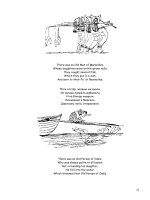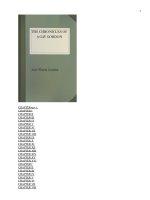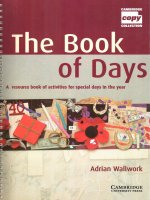Deadly kingdom: The book of dangerous animals - Gordon Grice
Bạn đang xem bản rút gọn của tài liệu. Xem và tải ngay bản đầy đủ của tài liệu tại đây (5.45 MB, 845 trang )
ALSO BY GORDON GRICE
THE RED HOURGLASS: LIVES OF THE PREDATORSFor Tracy, Parker, Beckett, Griffin, and Abilene
Philosophy is really there to redeem what lies in
an animal’s gaze.
—THEODOR ADORNO
CONTENTS
INTRODUCTION
THE CARNIVORIDS
1. WOLVES, DOGS, AND THEIR KIN
2. THE BEARS
3. THE CATS
4. THE HYENAS
5. OTHER CARNIVORIDS
AQUATIC DANGERS
6. SHARKS AND THEIR RELATIVES
7. THE BONY FISH
8. THE WHALES
9. AN ASSORTMENT OF AQUATIC DANGERS
THE REPTILES AND BIRDS
10. THE SNAKES
11. THE CROCODILIANS
12. THE LIZARDS
13. THE BIRDS
THE ARTHROPODS AND WORMS
14. THE ARACHNIDS AND MYRIAPODS
15. THE INSECTS
16. THE WORMS
OTHER MAMMALS
17. THE HOOFED MAMMALS
18. THE ELEPHANTS
19. THE RODENTS
20. THE BATS
21. A MISCELLANY OF MINOR MAMMAL DANGERS
22. MONKEYS, APES, AND THEIR KIN
ACKNOWLEDGMENTS
FURTHER READING
ILLUSTRATION CREDITS
INTRODUCTION
“BUT WHY CAN’T WE GO LOOK AT IT?” I asked my
mother.
“Because it’s dangerous,” she said.
“We could watch from the car.”
“We’ll go back into town and let
Granddad handle it.”
“We never get to do anything fun,” I
said, but the argument was lost already,
the red cedar fence posts clicking by
faster and faster outside the car window. I
picked at the threads in the green
upholstery of the backseat. Mom was
putting miles of safety between us and the
cougar treed in front of our farmhouse.
My grandfather had waved us down as we
drove home from errands and told us to
proceed no farther. I was six; it didn’t
occur to me to worry about my
grandfather. I only knew I was missing
out on something.
The next time I saw him, Granddad was
the same as always, tossing his silver head
as he told his jokes, smiling in his broad
but mysterious way, like the man on the
Quaker Oats box. He had little to say
about the fate of the cougar. Only with
the distance of years do I understand
what must have passed among the adults
of my family, how they must have felt to
see a predator like that in the elm tree my
sister and I played beneath each day.
We lived in the Oklahoma Panhandle,
where the soil was black as coee and
could be coaxed to grow anything if only
you could pipe enough water to it. It was
a land of extremes, of tornadoes and
droughts and dust storms, and the sense of
history I absorbed from my family was
centered on the apocalypse of the Dust
Bowl. It was a land where things that
ought to seem strange happened as a
matter of course. One clear summer
afternoon, we felt a rumble low in our
bones, and then the house seemed to
quiver like a drop of water thinking of
falling. It was over in a second.
MY GRANDFATHER ON HIS HORSE, OLE CHARGER.
“Earthquake!” my sister Meg and I
shouted as one. Mom was dubious;
whatever it was had made a sound, and
the sound had seemed to come from the
corral. Granddad sipped his tea calmly.
Meg and I tore out to the corral, shouting
back to Mom that we promised to be
careful.
Near the cattle tank we came upon a
smoking scatter of stones, clearly the
breakings of a single rock. The original
mass must have been bigger than a
basketball.
“Volcano rocks!” I said.
“But where’s the volcano?” Meg said.
We looked all around us. The horizon was
at in every direction. There were no
peaks, nothing that might have passed for
a volcano, even with imagination. We
came speeding back into the house to
report our findings.
“It must be a meteor,” Granddad
explained. It was a new idea for us.
“Don’t touch it,” Mom said. “It’s
probably still hot.”
The pieces looked dierent after they
cooled—smooth green wedges, like slabs
cut from mint ice cream. They were
heavier than they looked, heavier in fact
than any rock I’d ever hefted. Meg and I
used them when we played Star Trek; they
were moon stones, valuable ore, some
transmutative substance. Meg came home
from school with a set of terminology—
meteor, meteoroid, meteorite—that she
drilled into me, and when we next saw
our cousins, we all went out to watch for
meteorites and make fun of people who
called them falling stars. And we went on
with our lives as if nothing much had
happened.
But the Panhandle oddities that
interested me most were biological: a two-
headed Hereford calf at the local museum,
plagues of grasshoppers and rabbits,
mastodons dug out of the elds, the tracks
of allosaurs found in stone. Carnivals
came through, displaying ve-legged
sheep and three-legged hens and, once, a
pickled two-headed human baby. One
summer when I was ten, prodigious
congregations of black crickets rose from
the soil. They seethed beneath the outdoor
lights. Once they came pouring over the
edge of our front porch, where a friend
and I had just squashed a grasshopper. It
seemed, for a panicky moment, like
retribution.
Only as I write this do I realize how
forbidding the Panhandle must seem to
outsiders. To us, it was home. My father’s
family had lived there since 1904, which
was virtually as long as cattle and
railroads had been there in place of bison
and mustang herds. The lives of my
ancestors were riddled with ghost towns
and vanished homesteads, but here they
had made the earth yield. All of my
grandparents were farmers, and that
occupation was understood to call for a
kind of integrity others couldn’t muster.
But we were a family falling away from
the land. My mother would have been
happier in town. My father liked the
country, but not the life of a farmer. By
the time I was a teen, he owned a eet of
tow trucks, and my mother held an oce
job. They’d become townies. I still spent a
lot of time in the country with kinsmen
and friends, but I’d lost something. I
never got it back.
THE REAL COUGAR passed from my life
permanently. I never even glimpsed him.
But the memory of him was written in
re. It seemed a special cruelty for my
elders to deny me his company, for I was
already obsessed with wild animals and
wanted to see him more than I can
perhaps make clear. Already I had heard
the voice of the bobcat and followed the
delicate and sinuous track of the
rattlesnake; soon I would begin to keep
insects and spiders in jars; within a few
years I would ll notebooks with my
observations and drawings of wildlife. I
have spent much of my adult life in the
same pursuits.
A COUGAR BEGINS BY OPENING THE BELLY….
It was decades before I encountered
another cougar in the wild. As before, I
never laid eyes on it. I had to use other
senses to detect it. I came into the
territory of this particular cougar by
accident when friends invited me to spend
a few days at a ranch in Wyoming.
My friends and I went out for a ride.
Our horses’ shoes clapped against the
steep granite as we worked our way
around the mountain’s shoulder. Then we
were into a stretch of open eld. My
horse, a big, unruly bay, trudged through
a clattering pile of bones. I reined him in
and asked Virgil, the wrangler, about the
carcass. We dismounted.
Virgil handed me the skull. It was about
as long as my hand, equipped with broad
molars for chewing vegetation. The front
of the mouth lacked teeth.
“Pronghorn antelope,” Virgil said,
untying his ponytail to bind it tighter.
“They don’t have front teeth. They use
their lips to pull in grass and leaves.” He
used his own lips to hold the rubber band
while he worked on his hair.
The horns themselves were gone. We
looked the bones over to see if we could
gure out what had killed the pronghorn.
We found plenty of marks, but what to
make of them?
“These look like something chewed on
them,” I said, holding up a femur and an
uncertain fragment.
“Could be,” Virgil said. “We’ve got
coyotes and cougars. Of course, anything
could chew on it once it was dead. God
knows how long it’s been here.”
Some soft gristle and a ap of hide
remained on the skull. It had too much
heft to be empty. I didn’t think it was old.
I tied it to my saddle to take back to the
bunkhouse. A pair of sluggish insects built
like gray bullets emerged from an eye
socket and crawled down opposite sides
of the nose: carrion beetles.
At the ranch house I scrounged a ve-
gallon bucket and lled it with water.
When I immersed the skull, dozens of
beetles came struggling out from the eye
sockets and the innite papery
complications of the nasal cavity. A three-
year-old boy with a disconcerting
tendency not to blink watched me. This
small kinsman of my hosts turned to
whisper something to his uncle. I had seen
them earlier hiking a little way into the
hills. They had stood over the leg bones of
a deer and talked a long while. The uncle
reported the conversation to me: the boy
asking how the bones “fell out” of the
animal, the uncle trying to explain death
as “going back to the earth.” Now they
huddled again, apparently discussing the
pronghorn skull and its colonizers.
I went to work cleaning the skull and
forgot about the little boy. When I looked
up I found him standing on the porch
above me, staring. I had just plunged the
skull into a fresh bucketful of water, and
a new set of carrion beetles came out in a
panic, as if they had slept through the
rst dousing. They struggled over each
other to stay above the surface. The boy
stared at the troubled water, the skull
gazing back from the bottom of the
bucket.
“The bugs help him go back to the
earth,” the boy said, ngering a toy six-
shooter.
As I walked to the kitchen the next
morning, led by the smell of bacon, I had
to pass a pigpen. I stopped to lean on its
rails and look the pigs over. There were
ve, all patched with brown and white
except for one plump pink hog. I
wondered what pigs think of that savory
smell.
Virgil came up and leaned on the rail
next to me. I declined the bent Marlboro
he oered. A fresh piece of lumber stood
out among the weather-beaten planks and
posts; I kicked it idly.
“I put that on last week,” Virgil said.
“Cougar tore the old board off.”
He told the story, pausing three times to
light the recalcitrant cigarette. He’d
woken one night to the screams of the
pink hog. The cougar had it by the hind
leg and was trying to drag it through the
break in the fence. Virgil red a shotgun
in the air to scare the cat o. I could see a
deep black seam of healing wound on the
hog’s leg. I asked whether the cat had
been back since.
“Not up here close to the house,” Virgil
said. He’d gone shing at a stock pond
the day before yesterday. When his horse
started acting spooky, he packed his gear
and headed for the ranch house. He
returned to the pond later that afternoon.
The cougar’s tracks led down to the fallen
log at the water’s edge where he’d sat
fishing.
Near dusk Virgil asked me to help him
drive a few head of cattle into their
evening pasture. The cattle knew the drill;
all we had to do was keep them moving.
We did it on foot.
We were walking a dirt road. The
cattle, with their hides of rust and cream,
hustled ahead of us. On our left was a
fenced pasture; on our right was a bank
of heavy brush. The road changed
abruptly from hard-packed dirt to a patch
where frequent runo from a hill had left
soft, smooth undulations of dirt. On this
softer ground the cattle kicked up a little
dust. It was on this stretch I spotted the
pugmarks of the cougar. They dappled the
road for several yards, obscured in two
places where the cattle had crossed them.
A good rain had fallen about two hours
earlier. The tracks must have been made
since then.
Soon we had the cattle in their pasture.
Virgil needed a minute to wrestle the
broken gate shut. Suddenly we both
looked toward the brush, then at each
other, then back at the brush. I scanned
the ditch tangled with grass and stunted
trees.
Virgil whispered a long string of
profanities. He told me later he had heard
something at that moment, a subtle click
that might have been the breaking of a
twig. I wasn’t aware of hearing anything.
I just suddenly got a cold feeling in my
scalp, and I knew I was being watched.
We started toward the ranch house, Virgil
cursing steadily. We walked slowly. I









